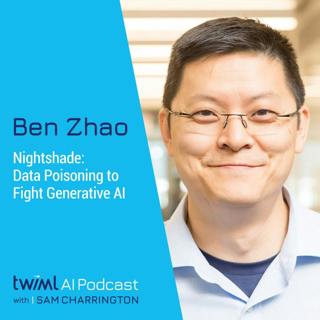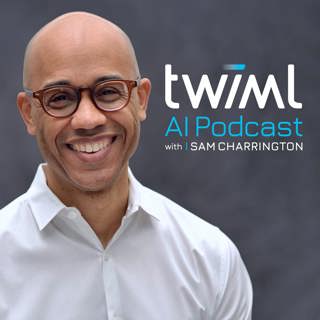
Nightshade: Data Poisoning to Fight Generative AI with Ben Zhao - #668
Today we’re joined by Ben Zhao, a Neubauer professor of computer science at the University of Chicago. In our conversation, we explore his research at the intersection of security and generative AI. We focus on Ben’s recent Fawkes, Glaze, and Nightshade projects, which use “poisoning” approaches to provide users with security and protection against AI encroachments. The first tool we discuss, Fawkes, imperceptibly “cloaks” images in such a way that models perceive them as highly distorted, effectively shielding individuals from recognition by facial recognition models. We then dig into Glaze, a tool that employs machine learning algorithms to compute subtle alterations that are indiscernible to human eyes but adept at tricking the models into perceiving a significant shift in art style, giving artists a unique defense against style mimicry. Lastly, we cover Nightshade, a strategic defense tool for artists akin to a 'poison pill' which allows artists to apply imperceptible changes to their images that effectively “breaks” generative AI models that are trained on them. The complete show notes for this episode can be found at twimlai.com/go/668.
22 Jan 202439min

Learning Transformer Programs with Dan Friedman - #667
Today, we continue our NeurIPS series with Dan Friedman, a PhD student in the Princeton NLP group. In our conversation, we explore his research on mechanistic interpretability for transformer models, specifically his paper, Learning Transformer Programs. The LTP paper proposes modifications to the transformer architecture which allow transformer models to be easily converted into human-readable programs, making them inherently interpretable. In our conversation, we compare the approach proposed by this research with prior approaches to understanding the models and their shortcomings. We also dig into the approach’s function and scale limitations and constraints. The complete show notes for this episode can be found at twimlai.com/go/667.
15 Jan 202438min

AI Trends 2024: Machine Learning & Deep Learning with Thomas Dietterich - #666
Today we continue our AI Trends 2024 series with a conversation with Thomas Dietterich, distinguished professor emeritus at Oregon State University. As you might expect, Large Language Models figured prominently in our conversation, and we covered a vast array of papers and use cases exploring current research into topics such as monolithic vs. modular architectures, hallucinations, the application of uncertainty quantification (UQ), and using RAG as a sort of memory module for LLMs. Lastly, don’t miss Tom’s predictions on what he foresees happening this year as well as his words of encouragement for those new to the field. The complete show notes for this episode can be found at twimlai.com/go/666.
8 Jan 20241h 5min

AI Trends 2024: Computer Vision with Naila Murray - #665
Today we kick off our AI Trends 2024 series with a conversation with Naila Murray, director of AI research at Meta. In our conversation with Naila, we dig into the latest trends and developments in the realm of computer vision. We explore advancements in the areas of controllable generation, visual programming, 3D Gaussian splatting, and multimodal models, specifically vision plus LLMs. We discuss tools and open source projects, including Segment Anything–a tool for versatile zero-shot image segmentation using simple text prompts clicks, and bounding boxes; ControlNet–which adds conditional control to stable diffusion models; and DINOv2–a visual encoding model enabling object recognition, segmentation, and depth estimation, even in data-scarce scenarios. Finally, Naila shares her view on the most exciting opportunities in the field, as well as her predictions for upcoming years. The complete show notes for this episode can be found at twimlai.com/go/665.
2 Jan 202452min

Are Vector DBs the Future Data Platform for AI? with Ed Anuff - #664
Today we’re joined by Ed Anuff, chief product officer at DataStax. In our conversation, we discuss Ed’s insights on RAG, vector databases, embedding models, and more. We dig into the underpinnings of modern vector databases (like HNSW and DiskANN) that allow them to efficiently handle massive and unstructured data sets, and discuss how they help users serve up relevant results for RAG, AI assistants, and other use cases. We also discuss embedding models and their role in vector comparisons and database retrieval as well as the potential for GPU usage to enhance vector database performance. The complete show notes for this episode can be found at twimlai.com/go/664.
28 Des 202348min

Quantizing Transformers by Helping Attention Heads Do Nothing with Markus Nagel - #663
Today we’re joined by Markus Nagel, research scientist at Qualcomm AI Research, who helps us kick off our coverage of NeurIPS 2023. In our conversation with Markus, we cover his accepted papers at the conference, along with other work presented by Qualcomm AI Research scientists. Markus’ first paper, Quantizable Transformers: Removing Outliers by Helping Attention Heads Do Nothing, focuses on tackling activation quantization issues introduced by the attention mechanism and how to solve them. We also discuss Pruning vs Quantization: Which is Better?, which focuses on comparing the effectiveness of these two methods in achieving model weight compression. Additional papers discussed focus on topics like using scalarization in multitask and multidomain learning to improve training and inference, using diffusion models for a sequence of state models and actions, applying geometric algebra with equivariance to transformers, and applying a deductive verification of chain of thought reasoning performed by LLMs. The complete show notes for this episode can be found at twimlai.com/go/663.
26 Des 202346min

Responsible AI in the Generative Era with Michael Kearns - #662
Today we’re joined by Michael Kearns, professor in the Department of Computer and Information Science at the University of Pennsylvania and an Amazon scholar. In our conversation with Michael, we discuss the new challenges to responsible AI brought about by the generative AI era. We explore Michael’s learnings and insights from the intersection of his real-world experience at AWS and his work in academia. We cover a diverse range of topics under this banner, including service card metrics, privacy, hallucinations, RLHF, and LLM evaluation benchmarks. We also touch on Clean Rooms ML, a secured environment that balances accessibility to private datasets through differential privacy techniques, offering a new approach for secure data handling in machine learning. The complete show notes for this episode can be found at twimlai.com/go/662.
22 Des 202336min

Edutainment for AI and AWS PartyRock with Mike Miller - #661
Today we’re joined by Mike Miller, director of product at AWS responsible for the company’s “edutainment” products. In our conversation with Mike, we explore AWS PartyRock, a no-code generative AI app builder that allows users to easily create fun and shareable AI applications by selecting a model, chaining prompts together, and linking different text, image, and chatbot widgets together. Additionally, we discuss some of the previous tools Mike’s team has delivered at the intersection of developer education and entertainment, including DeepLens, a computer vision hardware device, DeepRacer, a programmable vehicle that uses reinforcement learning to navigate a track, and lastly, DeepComposer, a generative AI model that transforms musical inputs and creates accompanying compositions. The complete show notes for this episode can be found at twimlai.com/go/661.
18 Des 202329min





















